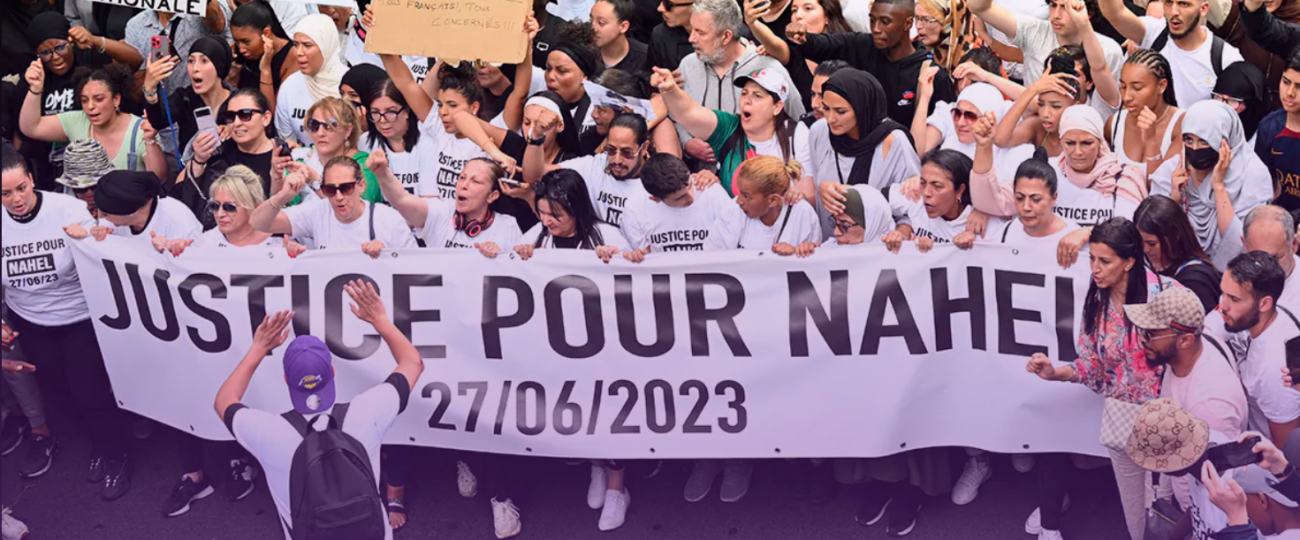In the year 2023, a policeman killing an unarmed teenager is still a recurring incident. The murder of Nahel Merzouk, a 17-year-old youth of Algerian descent, took place on Tuesday 27-6-2023 at around 8:18 am in the city of Nanterre, located in the western suburb of the French capital, Paris. The killing of the boy sparked protests that started in Nanterre and spread to other suburbs in Paris, while its sparks reached different regions in France, such as Marseille, Lyon and Lille.
The protests and the accompanying acts of burning and breaking not only erupted in response to the scene of Nahel’s killing, but also because of the accumulations and rejection of a long record of French police practices, which showcases its racism at every occasion. Because of that, the demonstrators do not see the incident of killing the brown boy isolated from a context of similar practices.
Before Nahel, drivers of immigrant backgrounds were shot and killed while driving. This context established the conviction that the motives of the crime were racist, and that the boy’s character, which was found to be of African immigrant descent, was what made the policeman shoot him directly to kill him. Even the United Nations High Commissioner for Human Rights has asked France to “consider seriously the deep problems of racism and racial discrimination within the police”. This is what France considered a “completely baseless” accusation.
The police and the false narrative
To justify the killing of Nahel, police sources had circulated through Agence France-Presse amongst others a preliminary version claiming that the victim tried to run over a police officer with his car during a traffic check, and the policeman had no choice but to shoot the driver. However, this police account was quickly refuted by a videotape documenting the moment the victim was shot and the death threat that preceded it, which an incident witness posted on Twitter.
In the video, the yellow Mercedes that Nahel was driving appears with two policemen nearby, one of whom rests his head on the driver’s window and the second rests his elbow on the windshield and points his weapon directly at the driver. In the recording, one of them is heard saying: “I will put a bullet in your head.” As soon as the car takes off, the policeman shoots directly at Nahel. The car stops a few meters away after hitting a pole, and Nahel dies despite attempts to resuscitate his heart.
This video exposed the lies of the police sources, whose initial account was circulated by prominent media outlets. The police narrative had prompted the prosecutor of Nanterre to declare that he would open an investigation on charges of attempted premeditated murder of a person holding public authority.
However, the video pushed for this charge to be dropped, and exposed the police’s attempt to cover up the crime and protect its members from accountability, which prompted Yassine Bouzrou, the lawyer for Nahel’s family, to claim false testimony. For his part, in a televised interview, the policeman’s lawyer denied that his client had claimed in his preliminary testimony that the boy had tried to run him over, which confirms the lie of the police account. The newspaper Libération had criticized the coverage of its colleague Le Parisien and the channel BFMTV because they “covered the news of the death of the boy and reported without sufficient caution of the police account.”
Despite the publication of the video, the police continued to try to justify the killing of the boy through the statements of its representatives, who were keen on appearing in the media to take control of the narrative. In an interview with BFMTV, and in response to whether the policeman’s behavior was justified, the Paris chief of police considered that the policeman’s statement should be heard to see if he sensed danger before shooting.
On the other hand, nobody paid attention to Nahel’s feeling of danger after the policemen threatened to shoot him and pointed the weapon directly at him. It is as if the police are looking for a justification for killing a minor even if the video doesn’t prove that he forms any threat. In this sense, the police seem to be short of an explanation on why a young driver escaped from the police, while he faced a death threat, something that can be clearly seen in the video as a weapon was pointed at him.
Law and police jurisdictions
Defenders of the policeman who killed Nahel rely on Article 435, first paragraph of the Internal Security Law issued in 2017. According to legalists, the article gives the police the right, in the event that drivers do not comply at checkpoints, to use their weapons when there is a possibility that their escape would pose a threat to the life of the policeman or to the lives of others. Jurists believe that the word “possibility” is loose and subject to the discretion of the policemen.
On December 15, 2022, the French parliament called for replacing the word “possibility” with “imminent danger”, while also not targeting the driver as much as the wheels, but the matter was not discussed. Jurists believe that the security doctrine in France is heading towards the use of violence. This is what appears in a statement issued by the police unions alliance (Alliance Police Nationale) and the UNSA Police (Organisation syndicale représentative de la Police Nationale, Syndicalist Organization representative of the National Police) in response to the protests, which were accompanied by arson and destruction. The statement called for fighting against “the mischievous and savage hordes that have participated in the nightly riots since the death of young Nahel.”
As a response to this speech, the leader of the French left, Jean-Luc Mélenchon, accused the police unions of calling for a civil war. An opinion poll conducted by the Cluster 17 polling institute and published by France 24 agency showed that, in the first round of the 2022 presidential elections, 64% of the police and army members voted for the extreme right, 39% for Marine Le Pen and 24% for Eric Zemmour.
While the protests were still on-going, the fund-raising campaign for the family of the policeman who killed Nahel was very significant. As the campaign closed on the night of Tuesday, July 4, after collecting about one and a half million euros within 5 days. It is a campaign launched by Jean Messiha, former spokesman for Eric Zemmour. The campaign and the demand for donations appear to be a reward for the policeman for killing a French youth of immigrant origin, and an encouragement to his colleagues to follow his example and limit the impact of the punishment that may be inflicted on him as a result of his crime, which called for a lot of criticism.
Deeply-rooted crises
The protest movement has declined, while political officials and all concerned parties do not seem to actually pay attention to the size of the problem and the reasons for this political outbreak. Rather, the authorities still ignore the deeply-rooted causes, as the official discourse focused on parents’ responsibility to prevent their children from participating in protests. It also raised the possibility of imposing financial penalties on parents whose children are arrested. It is a proposition that deepens the crisis.
It is not a minor detail that the age of one-third of those arrested by the police on charges of rioting does not exceed 18 years.
Rather, it is an indication of the distrust of a large part of the younger generation in law enforcement agencies as well as their need to communicate their desire to rebel and express themselves in reaction to a sense of marginalization.
These events do not only raise the issue of police violence, but also that of the situation of the suburbs and working-class neighbourhoods surrounding the capital, the majority of which is inhabited by immigrants and their children. It also raises the question about the effectiveness of the integration policies adopted and the plans implemented during the last four decades, as well as about the impact of the colonial legacy on the relationship between citizens of the same state.

Mariam Seifeddine is a member of the World March of Women in Lebanon. She is currently based in France.




